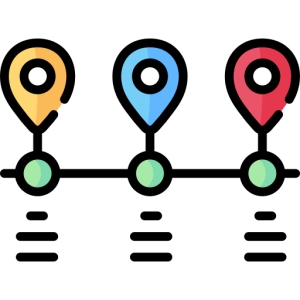The Project “TALKSCAPES – Talking about us and our European Communities by talking about our life landscapes”, as a European transnational cooperation project between Schools from Italy, Romania, Bulgaria, Poland and Greece, moves from the consciousness that European Landscapes shape “daily life sceneries” of European civic Communities, also with respect to continuous solicitations of the global “migration networks”.
TALKSCAPES will drive Students and Teachers in enhancing competences to analyze and narrate to peers, as well as to adults, their own landscapes as “agents of socio-cultural mediation”, inclusion and identity.
TALKSCAPES will be strongly characterized by an innovative and comprehensive approach to language teaching and learning, allowing Students, Teachers and Technical Staff of each partner School and their educational and civic Communities, to become more aware of:
– their own life landscape, through approaches such as “landscape labeling” and “sentiment/emotional mapping”;
– the practical uses of foreign languages, also towards a better social inclusion of disadvantaged Students;
– “landscape configurations” across European human environments;
– diversity and identity within European Union, by directly experiencing socio-cultural contexts of each partner School.
The concrete objective of TALKSCAPES is to implement an educational digital platform, easily accessible and usable by Students, Teachers and any other people interested, and intertwined with eTwinning.
It will be named EYLIP – European Youth Landscape Interpretation Platform and consist of:
EYLIM – European Youth Landscape Interpretation Map, a landscape multilingual web mapping tool;
EYLIL – European Youth Landscape Interpretation Lexicon, a multilingual interpretive lexicon of European Youth Landscapes;
European Youth TalkScaPedia: a wiki-based module to collaboratively describe the elements of European landscapes;
TalkScapes knowledge-base enriched with Open Education Resources produced within TALKSCAPES.
The following groups will be involved:
– the Project Team, about 30 persons (Directors, administrative referents and at least 4 teachers for each School, forming the Local Coordinating Teams);
– Local School Workgroups, about 40 Students (10 up to 16 years old) and 6 Teachers for each partner School;
– TALKSCAPES local Community (Students, Teachers, School’s Staff, other schools’ representatives, parents, local government bodies representatives, organizations’ and associations’ representatives, experts and scholars, and so on), with some hundreds persons for each partner;
– TALKSCAPES Project Community composed of all members of the previous groups and all other people engaged.The TALKSCAPES action program foresees:
– the kickoff meeting to present the Project and its educational Community to public, institutions and local government bodies;
– periodic steering workshops to optimize Project and tasks realization;
– the identification of some paradigmatic landscapes with respect to each local socio-cultural context;
– the mapping of physical, historical and socio-cultural characteristics of each landscape case study;
– the implementation of the TALKSCAPES web platform and its digital modules;
– the collection of all data and knowledge to identify, analyze and describe landscape case studies;
– the production of some suitable multimedia and Open Educational Resources;
– n.5 mobilities to be held in each partner School Country, to allow Students and Teachers to directly meet different European cultures, languages, people and places;
– the final event to publicly illustrate the educational work undertaken during the 24 months of the Project;
– periodic monitoring aimed at assessing and tuning the Project and the undertaken action program;
– a dissemination plan based on: periodic internal updates; public dissemination materials such as video-clips, reports, fact sheets, flyers and booklets, etc.; the TALKSCAPES Press Kit for any press usage; official reports to local government bodies, cultural institutions, schools, etc.;
– self-evaluation process to assess TALKSCAPES outcomes.
TALKSCAPES is expected to achieve specific results as regards personal communication skills, practice of English language use, basic knowledge of the other mother tongues, soft and digital skills, problem solving and critical thinking.
In the long-term, the TALKSCAPES Project will made it possible to:
– favour the establishment and the development of new professional and personal relationships, by exchanging methodologies, technological approaches and teaching experiences;
– transfer the results into other contexts where it is emerging the role of European “landscape configurations” as “agents of socio-cultural mediation”;
– activate a new eTwinning Project as an evolution of TALKSCAPES framework.

